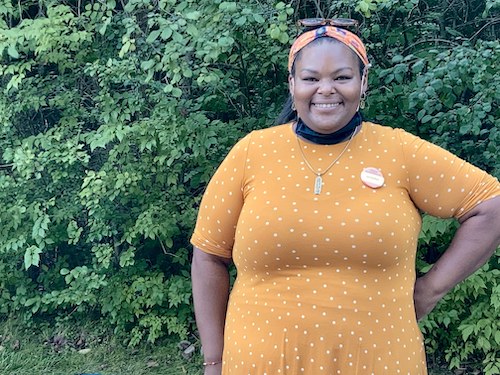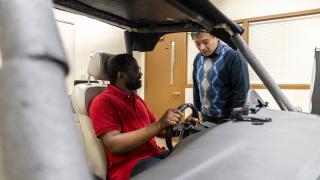
Campus’ Simone Dixon is UM-Dearborn’s first Project Manager for Violence Prevention and Response Initiatives. In this role, she’ll serve as campus’ support person for survivors of sexual assault, domestic violence, dating violence and stalking. She’ll also help develop culturally-relevant, campus-based programming with the goals of strengthening and creating new educational and training services.
This dedicated advocate is serious about helping start conversations that shift perspectives. But to do that, you need to be relatable. And Simone is — she’s an engaging communicator with a sense of humor.
She shares that she likes trying out Pinterest projects, even if they end up a Nailed It!-level fail. She enjoys a good “dad joke.” Here’s one: “I went to the doctor and they told me I had to cut back on my caffeine intake. I asked if I could get a second opinion and they said “Yes, of course! Your shoes are ugly too.” And she really likes the energy that comes with being on a college campus.
Talking with Simone recently, she shared how she knew UM-Dearborn was the right fit for her, how her family experiences helped shape her career interests, and the importance of setting boundaries when it comes to self care.
Question: Your role on campus is a newly created one. Can you share a bit about it?
Simone Dixon: UM-Dearborn was awarded a grant through the U.S. Department of Justice’s Office on Violence Against Women. My position was created from the grant to “reduce domestic violence, dating violence, sexual assault and stalking on campus.”
Q: What about UM-Dearborn impressed you?
SD: Data shows that UM-Dearborn is one of the safest campuses in the state of Michigan. During my interview, I asked why campus wanted to do work on violence prevention if they were ranked among the safest. The answer? They felt they could still do more to make sure people are safe and supported. That’s when I knew this was the right place for me.
If the commitment is there, we can work through the difficult topics — biases, discrimination, harassment, systemic racism, sexism. I’ve had people email me and say, “I’m nervous to have these conversations. I don’t know enough.” When I reply to messages, I want to know their “why” so I can understand how to develop and facilitate what is needed.
Honestly, if someone says it’s because they care or their team cares, that’s good enough for me. The commitment is the most essential part. I’m not here to make you change; that part is up to you. I’m here to share why it’s important to have compassion for all people, not just the people who are similar to us.
Q: What led you to a career in supporting people?
SD: I was raised in a household that was big on empathy and service. We volunteered in soup kitchens and worked in our community. No one is above receiving help or giving help — that was a message that my parents made clear through their words and actions.
I started college thinking I wanted to go into social work, but things changed my mind right before applying to the social work program. My mom was diagnosed with breast cancer. She went from mammogram to biopsy to mastectomy in five months. It was physical and mentally traumatizing. We were scared and had questions, but the doctors kept responding with how lucky she was. It was dismissive. They weren’t hearing her.
I wanted to understand why. I found the Women and Gender Studies program and powered through it in a year — it gave me what I needed to explore our systems and why they work the way they do. I realized that those responding from listening and supportive roles operated from the framework of their understanding of our identities. Being a queer first-generation student of color, I noticed that more often times than not the support I was receiving didn’t take in into consideration my needs based on those identities. So I wanted to be that support.
I see it like this: For me, social work is the band-aid — the support and resources — needed after someone trips and falls over a sidewalk crack. But I learned that I want to know why the crack’s there in the first place so we can fill it in.
Q: Being an advocate is rewarding, but it can be stressful. How do you relieve stress?
SD: I do a few things. More times than not, they have a creative aspect to them. It really depends on how I’m feeling and which method of expression will allow me to recenter myself. I color. I get recipes off of Pinterest — some are meh, but others are really good. I made macaroni and cheese from scratch from a Pinterest recipe with a gouda and white cheddar sauce. My girlfriend loved it. I also refinish furniture. I found a bench on Facebook Marketplace — the top was scratched and nicked, but it was cheap. I got three yards of a rich green fabric and spent hours pulling and tightening fabric across the top and securing it in place with a nail gun. That nail gun takes a lot out of you, but it was worth it. I have a great looking bench for $30 and I’m proud that I did it myself.
Q: What advice do you have for people to make time for self care?
SD: Lean into the power of “no”. This is something that I have been working on. I’m naturally an empathetic person. I want to help. I want to get involved. But it becomes stressful when it feels like it’s expected because you are typically the first one to volunteer or because you are the only one who doesn’t have kids.
I know many people who, like me, want to help — but they need to take care of their own lives too. Yes, I don’t have kids. But I have a career, graduate school, a girlfriend, and things I want to accomplish. It’s important to set boundaries and don’t feel guilty. It’s hard to do — so start with small steps. For example, if you are asked by your friends or family to do something and it’s not convenient...but you don’t want to say no, agree to it on a day or time that’s better for you. If they won’t factor your needs into what they’re asking of you, make it a hard no. It’s still a struggle for me, but I’m learning that the word no is not the end of the world. It makes room for priorities and self care.
For more information regarding getting involved, the Coordinated Community Response Team or questions you may have, please contact [email protected].


